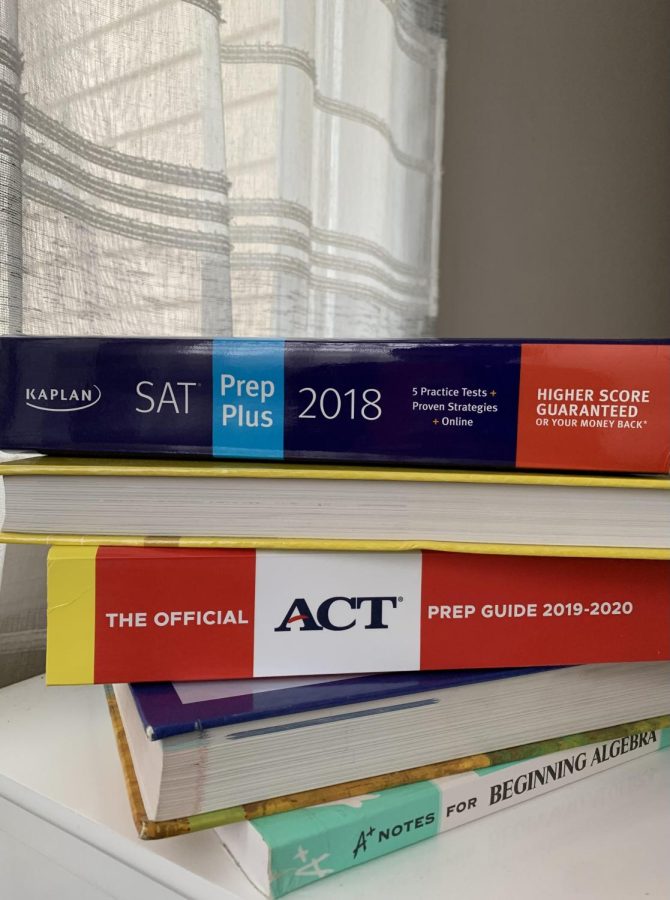Students can do well on the SAT without the price tag of a tutor
SAT and ACT studying resources are stacked on top of each other in abundance, on Oct. 31, 2022. Should self-studying be the major form of preparation for these standardized tests, or should high schoolers opt for paid tutors?
November 15, 2022
Standardized tests such as the SAT and ACT have always been a hot topic of discussion for high school students. Students are constantly concerned about how well they can score on these tests so that they can be accepted into the school of their dreams. Due to this fact, families are usually asking the question, are SAT/ACT tutors worth it?
Many people do believe that tutors are the right choice and hire tutors for their kids. Unfortunately, those people have all fallen victim to the same myth: that the SAT and ACT are tough tests. In reality, these tests are more manageable than they seem.
The SAT is a test that requires knowledge of 60 grammar rules and 110 math rules, familiarity with the content, along with other strategies to make each problem easier to tackle. So why are students who can maintain a high GPA in academically competitive schools like WCHS, often so anxious about this test? There is no good reason.
This fallacy is what deters students from self-studying to prepare for the SAT/ACT. It also drives parents to pay ridiculous amounts of money for their kids to have a tutor to help them prepare. According to Tutors.com, a website specializing in finding the best local tutors, in one area, SAT tutors can cost anywhere between $45 to $100 per hour. The Princeton Review, a well-known education services company that provides tutoring and test preparation, has hourly rates for SAT prep that can go up to a staggering $400.
These rates can be outrageous and outweigh the possible benefits. Resources for self-studying on websites such as Khan Academy or simply using the resources provided by College Board lack that hefty price tag while still containing the same amount of information to help prepare for the test.
Another myth is that some of these extremely accomplished students are “bad test-takers,” and would benefit from the guidance of a tutor. This belief is just plain nonsense.
There is no such thing as a “good test taker” or a “bad test-taker,” because most of the time, students who perform poorly on standardized tests are simply unprepared and do not practice adequately enough. A “bad test taker” is comparable to a “bad basketball player,” who plays basketball only a handful of times a year.
The real issue at hand is a lack of self-discipline. Many students find it difficult to stay motivated to practice for the SAT or ACT and believe that if they were under the supervision of a tutor, they would be more determined to work under all circumstances. This belief is another common misconception that is costly for families. As much as tutors can force their students to do their work when they are present and provide them with good review material, students must have the discipline to continue practicing independently. This is arguably even more important than the time spent working one-on-one with the tutor.
Self-studying helps students find their own motivation to succeed on the SAT/ACT. Additionally, this strategy allows students to build self-discipline, which is an essential skill needed for college and further careers.
If a student self-studies correctly for the SAT or ACT – through identifying and tackling strengths and weaknesses while constantly practicing to improve results – they will undoubtedly be successful. Those who hire private tutors may be happy with the results, but do not have the same opportunities to work on their discipline and are obligated to pay a considerable price.



